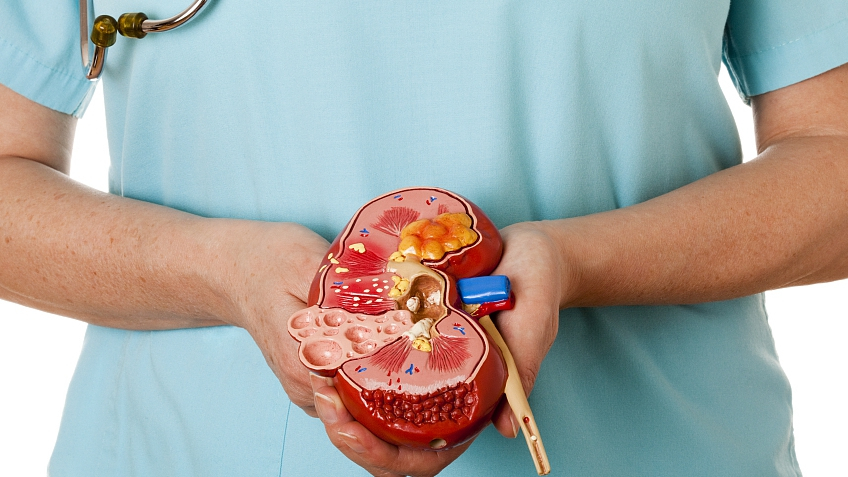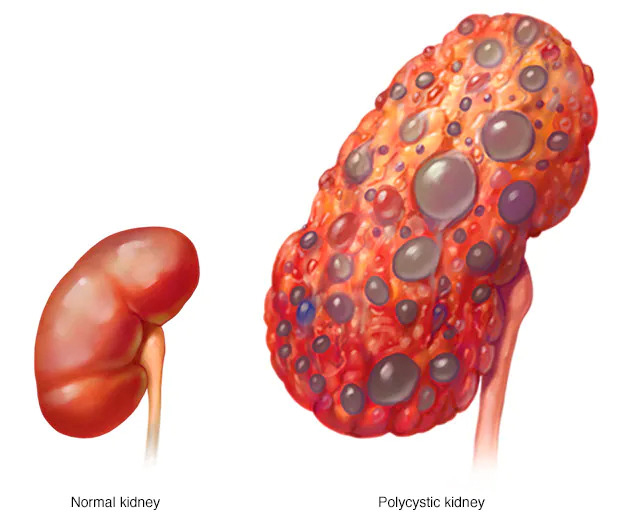Diabetic nephropathy is kidney damage that occurs as a result of diabetes. Diabetic nephropathy causes illness and sometimes death for people with diabetes. Diabetes affects approximately seven percent of people in the United States. In fact, diabetes is the leading cause of chronic kidney disease (CKD) and kidney failure in the nation.
Not everyone with diabetes develops chronic kidney disease, but researchers believe that those who do not properly control their blood glucose levels are at risk. The kidneys are each made up of around 1 million nephrons that remove extra fluid and wastes out from the blood. These nephrons help regulate water, salts, glucose, urea, phosphorus and other minerals. Those with diabetes have a lot of glucose that comes out in their urine. High blood sugar levels can damage the tiny blood vessels in the nephrons by thickening and scarring them so that over time they are damaged. When this happens, protein leaks through the kidneys into the urine. The nephrons are no longer able to filter properly and this is when kidneys damage can lead to kidney failure.
It is common for a doctor to check for diabetic nephropathy in someone with diabetes as part of a checkup. A urinalysis is done to see how much protein is in the urine. That is the main sign someone has diabetic nephropathy.
Some laboratory tests for diabetic nephropathy and kidney failure are:
If a patient with diabetes has a consistent amount of protein in their urine, has diabetic retinopathy (eye disease) and does not have any other kidney or renal tract disease, a doctor may be able to diagnose the disease by doing a kidney biopsy.
According to the U.S. National Library of Medicine, the following is a list of people who should be tested for diabetic nephropathy:
This does not mean testing for diabetic nephropathy is limited to these individuals. If a doctor believes a patient has diabetic nephropathy, he or she will perform a urinalysis. Because chronic kidney disease progresses over time, the sooner it is caught, the more steps can be taken to help slow the progression of kidney damage.
A person can have high blood pressure in addition to diabetic nephropathy. Because kidney damage can affect blood pressure and high blood pressure can cause more damage to the kidneys; blood pressure can be hard to control. The National Diabetes Information Clearinghouse (NDIC) states:
If you have high blood pressure, your doctor will prescribe medicines to help keep blood pressure in an optimal range. Your doctor may even prescribe blood pressure medicine if you do not have high blood pressure because some blood pressure lowering medicines have been shown to slow the progression of kidney disease.
Diabetic nephropathy needs to be treated in order to help slow kidney disease and other related complications.
Monitoring blood sugar levels and keeping glucose in an optimum range is important to help control kidney disease. Kidney damage may be halted or slowed down if blood sugar is kept in good range. Be sure to test your blood sugar levels often and keep track of what you eat so you know what is making your sugar level go up.
Another way to reduce the risk of more kidney damage is to keep blood pressure in check (under 130/80). Blood pressure medicine, such as angiotensin-converting enzyme (ACE) inhibitors and angiotensin receptor blockers (ARBs), may be prescribed by a doctor.
Here are some other recommended ways to help treat diabetic nephropathy and slow kidney damage:
For those with diabetes and kidney disease, maintaining a healthy heart is important. Those with diabetes are 2 to 4 times likelier to die of heart or blood vessel disease. Kidney disease patients are at an even greater risk of getting heart disease.
Low protein diets have been promoted for people with chronic kidney disease to decrease the kidney’s workload and perhaps delay progression of kidney failure. People with diabetes must approach protein restricted diets with caution. Having diabetic nephropathy means some protein is lost in the urine. Diabetics with poorly controlled blood sugar levels have increased protein breakdown and may need additional protein to prevent protein deficiency and muscle breakdown. Nutritional assessment by a dietitian to determine protein status and protein requirements is recommended before going on a low protein diet. Most people with diabetes need between .8 to 1.0 grams of protein per kilogram of body weight. Optimal blood sugar control is extremely important. Most people with diabetes require between 10 percent up to 20 percent of their calories from protein. The amount must be based on each person’s nutritional status, kidney function, and individual needs.
The recommended way to help prevent diabetic nephropathy is to keep blood sugar under control. A healthy diet, regular exercise, and taking the medicines prescribed by your doctor can also help prevent kidney disease. If you have diabetes and go to your yearly checkup, be sure that your doctor tests blood and urine for signs of kidney problems. The earlier diabetic nephropathy is detected, the better chances a person can treat and maintain his or her kidney function.
North Las Vegas
4107 w. Cheyenne Ave.
No. Las Vegas, NV 89032
| Phone: | (702) 383-9741 |
| Fax: | (702) 387-1145 |
| Mon | 8:00 AM – 4:00 PM |
| Tue | 8:00 AM – 4:00 PM |
| Wed | 8:00 AM – 4:00 PM |
| Thu | 8:00 AM – 4:00 PM |
| Fri | 8:00 AM – 4:00 PM |
| Sat | 8:00 AM – 2:00 PM |
| Sunday | Closed |
Dr. Rafael Franjul Diaz graduated from Universidad Nacional Pedro Henriquez Ureña, Santo Domingo; the Dominican Republic in 2005 and worked as a primary care physician for several years. Completed his Internal Medicine residency at Nassau University Medical Center in East Meadow NY in 2015 with board certification in Internal Medicine that same year. Went on to pursue his dream of becoming a Nephrologist and was accepted in the Nephrology fellowship program at Newark NJ and will be board eligible for Nephrology Board Certification in 2017. His interest is in all areas of nephrology with special attention in glomerular disease and peritoneal dialysis with publication in this area. Above all, Dr. Franjul Diaz is a dedicated physician that works hand to hand with his patients and guide them through the course of their condition. In addition, Dr. Franjul Diaz enjoys walking and jogging and is proud to call Las Vegas his home.
Dr. Charissa Marie R. Carag obtained her medical degree from the University of the Philippines College of Medicine in 2011. In addition, Dr. Carag completed her Residency in Internal Medicine and Fellowship in Nephrology at Rush University Medical Center in Chicago, Illinois. Dr. Carag earned her board certification in Internal Medicine in 2016 and Nephrology in 2018. She is a hard working, competent, and compassionate physician focused on providing high-quality care to patients. Above all, Dr. Carag is married and in her spare time enjoys hiking and exploring the Las Vegas food scene.
Dr. Cyril Ovuworie also known as “Dr. Over-worry”, graduated from the University of Lagos School of Medicine, Nigeria in 1991. He further completed his Internal Medicine Residency at Columbia University College of Physicians and Surgeons in New York, 1997. In 1999, he completed his Renal Fellowship at Johns Hopkins University School of Medicine in Baltimore, Maryland. And then he moved on to do a Transplant Nephrology Fellowship at Harvard Medical School in Boston, Massachusetts which he completed in 2000. He subsequently served as Clinical Instructor at University of California Los Angeles School of Medicine. Also Dr. Ovuworie participated in various research projects especially in the area of Endothelial Function, Homocysteine and Heart Disease. He and his colleagues have published many of their findings. most importantly, Dr. Ovuworie is on staff at most of the Las Vegas hospitals.


